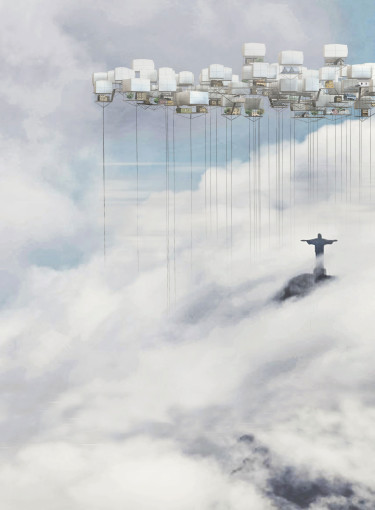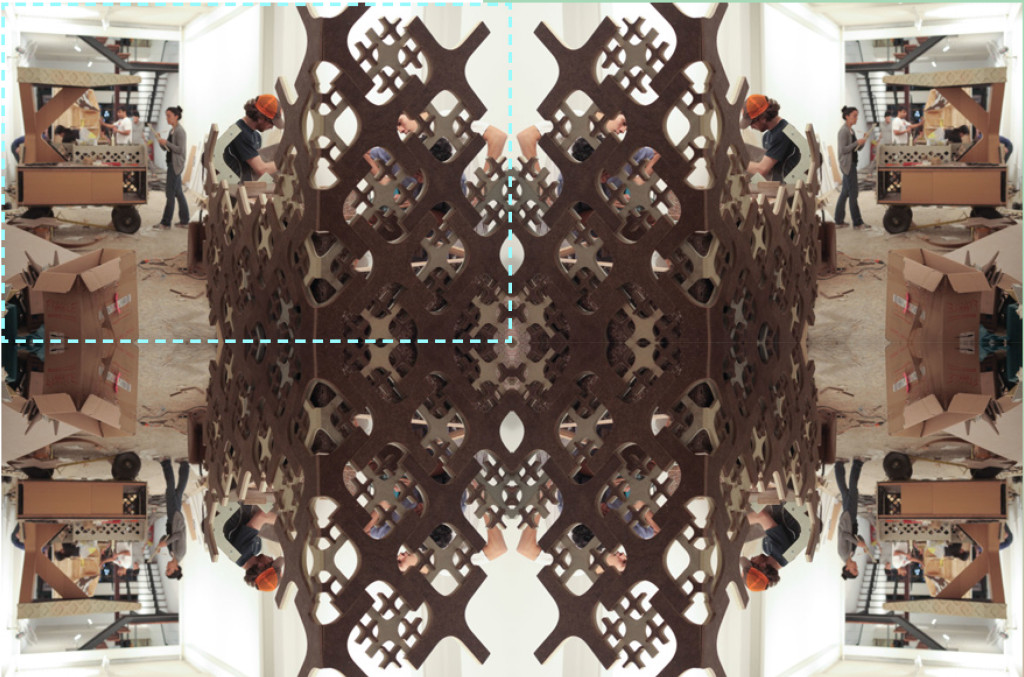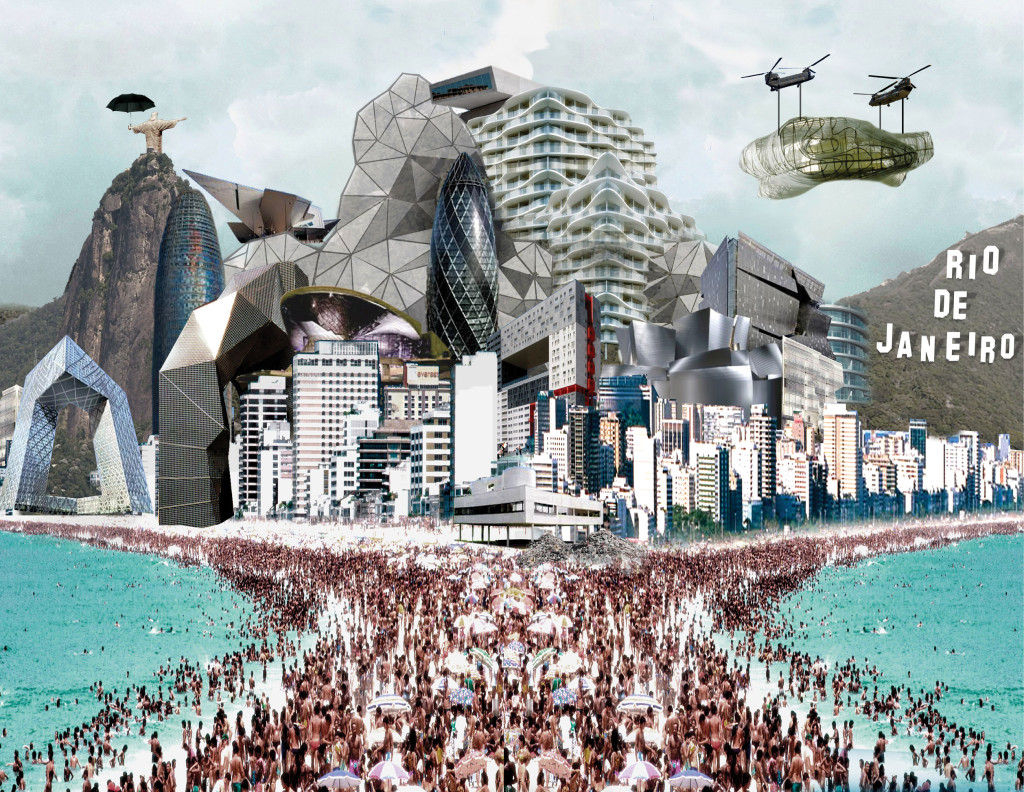Ceu de Janeiro | Rio CityVision Competition | First Prize

Donghua Che
interview by Sebastian Di Guardo
SDG: Many competitors have imagined a post-apocalyptic scenery. But you, you focused on hope, an idea, an answer, not just something built: you have thought about a strategy, a reaction. why?
DC: I am always optimistic. If I dream, I want to dream of something sweet, but never a nightmare. It is instinctive. I have always believed that common people can get over everything, especially when they have nothing left. So, I am more interested in a subjective initiative and everyday life, rather than an architectural strategy or technology solution.
SDG: Tell me more. What has influenced you most in imagining Ceu De Janeiro? An idea of architecture, a novel, a true story, a fairy tale.
DC: When I looked into the history of Rio de Janeiro and the references provided by Cityvision, I found that there are coincidences and clues; Rio was discovered because a Portuguese team settled down on a bay, and in history settlement was influenced and has evolved from this early social model – because they needed a centralized power in order to produce more and more efficiently in a stable environment. so I think that, if in the future, nature was to become instable, forcing people to move in order to survive, and if the land of the Rio (river in portuguese) would no longer be available, the sky (Ceu in portuguese) would be the last available field.
SDG: Why do you think nomadism would be a winning strategy?
DC: I am not sure if it would be a winning strategy but I know it would make a difference. Someday it might be more than a winner, because it would be a “game changer”.
SDG: But in your city of the future who, or what, is in command? is the “ship” without a captain? You have compared this city-system to the game of Go, but there is also a winner in Go, maybe the game in itself is more important than the winner?
DC: I said that this city is like the game of Go, to compare it with Chess, not because of their similar results (Go and Chess will eventually have a winner), but because they develop differently, the game of Go uses the same pieces to make a great siege, while chess uses pieces with different roles (king, pawn, etc.) calculating sacrifices and moves steps.
In this city, I think the captains don’t need to hold an overwhelming power. They would just take responsibility to conduct its running and guarantee its safety. That would be ideal. But that could happen only by suppressing greediness. So, I think there would be a captain in each ship. To be exact, there would be many ships and so many captains. Each tribe or unity would be connected to form a living network.
SDG: In the (real) world what moves the big mechanism of a city?
DC: I am from China. It shares something in common with Brazil. They are both huge developing countries. They both have complex population problems. For now, the desire for developing results in centralized power, that direscts the city. But I think it is the common people that move the big mechanism of a city. There is an old Chinese saying that talks about the energy of the people, “while the waters can bear the boat, they can also sink it.” Here, the water represents the people and the boat a country or city.
SDG: In the end, the utopia -always- allows us to reason about the possibilities of the future. It is generated by its opposite, by understanding what we do not want anymore, at any level. What isn’t there anymore in your Ceu compared to Rio? How has the general economic development of Brazil and the recent protests for the Confederations Cup influenced your idea? I noticed that there is no more football in your Ceu, and neither the great iconic buildings of economic progress.
DC: The general economic development of Brazil is about the efficiency and development of settlement society, and the recent protests for the Confederations Cup is about the opposite effect brought by such efficiency and development. So, I think it makes sense if we change and pay attention to the microcosm of common people. After a hundred years’ fast development, maybe we wouldn’t emphasize efficiency if it spells consumption and sacrifice of more, maybe we wouldn’t need to develop all the time if survival came first. So, Ceu needn’t be more excellent than Rio. It just needs to different, be another choice.
SDG: I loved your idea of putting a story, a narrative to explain your idea. Imagine yourself living in your Ceu De Janeiro of the future, what kind of events, adventures and stories would you tell?
DC: Thank you. Living in Ceu de Janeiro, I’d feel like I owned the sky and everything. society would be highly developed, especially where instruction and technology are concerned. Maybe it wouldn’t need to develop any further. People would be focused on surviving and would have close relashionships, in order to share, migrate and live. I’d take my floating house around everyday and land somewhere, like a nomad in search of a house and resources. Life would be different, but the will to survive and freedom would be the same. It would be the milestone in history of this city, from Rio to Ceu, from settlement to nomad. And these two pages of the (Ceu Daily) newspaper would be a reflection of everyday life and the people.
SDG: Your project seems to be a spontaneous response, mathematical, the easiest solution. How is it possible? You think this is a merit of your project?
DC: My project is just a coincidence. I have a concept, a vision, whatever you want to call it. everything happens so fluently that it leads to the easiest solution, seeming to develop like in reality. But it’s a coincidence. And it could be seen as a merit of my project as I couldn’t imagine it any differently. speaking of possibilities, I don’t think my project could be created in the future as no one could have the certainty that these coincidences would appear step by step.
SDG: When a project is finished, sometimes the designer has some regrets, because he thinks that his project could have been better. In short, the designer falls in love with his project, and would like to carry on working on it. Did it happen to you? In other words: if you could go back in time, would you change anything about your project?
DC: As I said previously, what have accomplished is a coincidence. I would like it to be unique in my mind. I would not change anything right now, but as time passes, I could have new thoughts about it.
SDG: Rio is a contradictory, ambiguous city. will it be so in the future? Will the wonder and disgust remain? why do you think so? what are wonder and disgust to you?
DC: presently, people may think that in Rio, settlement is excellent and nomadism is pure craziness. In my project, I hope to see the other side of both. However, a hundred years later in Ceu, people may rethink that nomadic life is disgusting and not the wonder and hope we think it is today, they would go back to settlement if they could. So, in my opinion, “sick and wonder” is not only about duality, but of the transition between the two aspects.
ITALIAN VERSION _____________________________________________
SDG: Molti concorrenti hanno immaginato uno scenario post-apocalittico. Tu però ti sei soffermato sulla speranza, su un’idea, una risposta, non solo qualcosa di costruito: hai pensato anche una strategia, una reazione. Perché?
DC: Sono sempre ottimista. Se sogno, voglio sognare qualcosa di dolce, non un incubo. È istintivo. Ho sempre creduto che le persone semplici possono superare tutto, specie quando non hanno nulla dietro. Quindi sono più interessato ad un’iniziativa soggettiva e alla vita quotidiana, piuttosto che ad una strategia architettonica o ad una soluzione tecnologica.
SDG: Dimmi qualcosa di più. Cosa ti ha influenzato maggiormente nell’immaginare la Rio/Ceu del futuro? Un’idea di architettura, un romanzo, una storia vera, una favola..
DC: Quando ho letto la storia di Rio e i riferimenti che avete fornito, ho scoperto coincidenze e indizi; La baia di Rio è stata scoperta da una flotta portoghese che vi si stabilì, e nella storia l’insediamento è stato influenzato e si è evoluto a partire da questo primo modello sociale, perché c’era la necessità di un potere centralizzato per produrre di più e con efficienza, in un ambiente stabile. Quindi, ecco il confronto: insediamento-nomadismo, centralità-circolazione, ambiente stabile-ambiente mutevole. Quindi penso che se in futuro la natura divenisse instabile, costringendo le persone a spostarsi per sopravvivere, e se la terra del Rio (fiume) non fosse più disponibile, il cielo sarebbe l’ultimo “campo” disponibile.
SDG: Perché il nomadismo ti sembra una strategia vincente?
DC: Non sono sicuro che sia una strategia vincente, ma so che fa la differenza. Un giorno potrebbe essere qualcosa di più di un (sistema) vincente, perché sarà un “cambio di gioco”.
SDG: Ma nella tua città del futuro chi, o cosa, comanda? La “nave” è senza capitano? Hai paragonato questa città-sistema al Go, ma nel Go c’è anche un vincitore.. forse è più importante il gioco in se, piuttosto che il vincitore?
DC: Ogni tribù o unità di nomadi è connessa ad una forma di rete vivente. Così, ho detto che questa città è come il Go, per compararla agli Scacchi, non per il loro simile risultato (Go e Scacchi hanno un vincitore), ma perché si sviluppano differentemente, dato che il Go usa pezzi tutti uguali per fare un grande assedio mentre gli Scacchi usano ruoli diversi (re, pedone, ecc) calcolando sacrifici e mosse.
In questa città, non credo che i capitani abbiano bisogno di un potere schiacciante. Dovrebbero solo assumersi la responsabilità di condurne il funzionamento e garantirne la sicurezza. Questo sarebbe ideale. Ma accadrebbe solo con la soppressione della cupidigia. Quindi, penso che ci sarebbe un capitano in ogni nave. Per essere precisi ci sarebbero molte navi e molti capitani.
SDG: Nel mondo (reale) di oggi cosa credi che muova il meccanismo della città ?
DC: Io sono cinese. Abbiamo qualcosa in comune con il Brasile. Sono entrambi grandi paesi in via di sviluppo. Entrambi hanno complicati problemi di popolazione. Per ora il desiderio di sviluppo si concretizza in un governo centralizzato, che dirige la città. Ma io credo che sia la gente comune a muovere il grande meccanismo della città. C’è un vecchio proverbio cinese che parla dell’energia delle persone: “le acque possono sostenere una barca, ma anche affondarla”. Qui, le acque sarebbero le persone e la barca un paese o una città.
SDG: In fondo, l’utopia ci permette -sempre- di ragionare sulle possibilità che il futuro riserba. Essa nasce dai suoi opposti, dall’aver capito ciò che non vorremmo ci fosse più, a nessun livello. Cosa non c’è più nella tua Rio? Come il grande sviluppo economico del Brasile e le recenti proteste per la Confederation Cup hanno influenzato la tua idea di concorso? Ho notato che non c’è più il calcio nella tua Ceu, e nemmeno i grandi edifici simbolo del progresso economico.
DC: Il generale sviluppo economico del Brasile è dovuto all’efficienza e allo sviluppo della società dell’insediamento, e le recenti proteste per la Confederation Cup hanno a che fare con i lati negativi di questo. Quindi, penso che abbia senso cambiare, prestare attenzione al microcosmo della gente comune. Dopo cento anni di rapido sviluppo, forse non vorremo enfatizzare l’efficienza se significa consumo e sacrificio di tutto; forse non avremo sempre bisogno di sviluppo se la sopravvivenza diverrà il primo pensiero. Quindi, Ceu non dev’essere migliore di Rio. Dev’essere differente, un’altra scelta.
SDG: Ho molto apprezzato la tua idea di inserire una storia, una narrazione, per spiegare la tua idea di progetto. Immagina di vivere tu stesso nella tua Ceu del futuro, che genere di eventi, avventure, storie raccoglieresti?
DC: Grazie. Vivendo a Ceu de Janeiro, mi sentirei come se possedessi il cielo e ogni cosa. La società sarebbe molto sviluppata, specie per l’istruzione e la tecnologia. Forse non avrebbe bisogno di ulteriore sviluppo. Le persone sarebbero concentrate sulla sopravvivenza ed avrebbero strette relazioni, per condividere, migrare, vivere. Ogni giorno vorrei portare la mia casa galleggiante a volare e approdare, come un nomade che cerca casa e risorse. La vita sarebbe diversa, ma la volontà di sopravvivere e la libertà sarebbero le stesse. Sarebbe una pietra miliare nella storia di questa città, da Rio a Ceu, dall’insediamento al nomadismo. E queste due pagine del Ceu Daily sarebbero il riflesso della vita quotidiana delle persone.
SDG: Per come è stato presentato, il tuo progetto sembra una risposta spontanea, matematica, la soluzione più semplice. Com’è possibile? Pensi sia un merito del tuo progetto?
DC: Il mio progetto è solo una coincidenza. Ho un concept, una visione o come vuoi chiamarla. Tutto accade in modo così scorrevole che si approda alla soluzione più semplice, sembra svilupparsi come nella realtà. Ma è una coincidenza. E si potrebbe dire merito del mio progetto perché non potevo pensarlo diversamente. Parlando di possibilità, credo che il mio progetto non potrebbe realizzarsi nel futuro, perché nessuno può essere sicuro che le coincidenze appariranno passo passo.
SDG: Quando un progetto è finito, a volte il progettista ha molti rimpianti, perché pensa che poteva essere migliore. Insomma, si innamora del suo progetto, vorrebbe lavorarci ancora. Ti è successo? In altre parole: se potessi tornare indietro nel tempo, cambieresti qualcosa del tuo progetto?
DC: Come dicevo, ciò che ho realizzato è una coincidenza. Mi piacerebbe che fosse unico nella mia mente. Non cambierei nulla adesso, ma passando del tempo, potrei avere nuove idee su di esso.
SDG: Rio è una città contraddittoria, ambigua. Lo sarà anche in futuro? Rimarranno sia il disgusto che la meraviglia? Perché lo credi? Cosa sono per te disgusto e meraviglia?
DC: Attualmente, le persone potrebbero pensare che l’insediamento è ottimo mentre il nomadismo è una follia a Rio. Nel mio progetto, spero di poter vedere l’altra faccia di entrambi. Ma, cento anni dopo a Ceu, le persone potrebbero ri-vedere la vita nomade come disgustosa e non la meraviglia che oggi consideriamo come la speranza, e tornerebbero alla vita sedentaria se potessero. Quindi, per me, (il tema) “disgusto e meraviglia” non riguarda solo una dualità, ma anche la transizione tra due aspetti.
Related Posts :
Category: Article
Views: 6151 Likes: 1
Tags: Donghua Che , rio , rio city vision competition , Sebastian Di Guardo
Comments:
Info:
Info:
Title: Ceu de Janeiro | Rio CityVision Competition | First Prize
Time: 22 settembre 2013
Category: Article
Views: 6151 Likes: 1
Tags: Donghua Che , rio , rio city vision competition , Sebastian Di Guardo






